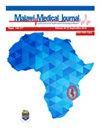Consumption and adverse reaction reporting of herbal medicines among people living with HIV at University teaching hospitals in Blantyre, Malawi and Ibadan, Nigeria
IF 1.2
4区 医学
Q4 PUBLIC, ENVIRONMENTAL & OCCUPATIONAL HEALTH
引用次数: 0
Abstract
Background Consumption of herbal medicines among people living with HIV is a common practice in Sub-Saharan Africa. The utilization of herbal medicines was at 17.5% and 67.9% in Malawi and Nigeria, respectively. There is inadequate data on use and adverse reactions (ADRs) reporting of herbal medicines among people living with HIV (PLWHIV). This study was designed to investigate use and ADRs reporting of herbal medicines among PLWHIV at the University Teaching Hospitals in Blantyre, Malawi and Ibadan, Nigeria.MethodologyA cross-sectional study was conducted among PLWHIV attending Antiretroviral Therapy (ART) clinic at Queen Elizabeth Central Hospital, Blantyre, Malawi and University College Hospital, Ibadan, Nigeria. A structured questionnaire was administered to 360 and 370 participants in Blantyre and Ibadan respectively, through face-to-face interviews after obtaining their informed consent. Results The prevalence of herbal medicines use among PLWHIV in Malawi and Nigeria was at 80.6% and 55.7% (p<0.001), respectively. The most frequently used herbal medicines in Malawi were Aloe vera (14.0%), Moringa oleifera (14.0%), Zingiber officinale (13.0%) and Allium sativum (7.0%). Likewise, in Nigeria, the most commonly used herbal medicines were Zingiber officinale (15.0%), Vernonia amygdalina (14.0%), Moringa oleifera (9.0%), and Allium sativum (11.0%). The major reason for herbal medicines’ use in Malawi was ready availability (42.1%) and perception that it boosts immunity (44.6%) in Nigeria. The PLWHIV reported experiencing suspected herbal medicine ADRs in Malawi (3.9%) and in Nigeria (8.0%).Conclusion A higher percentage of people living with HIV are using herbal medicines in Malawi as well as in Nigeria. In both countries, a few participants reported experiencing suspected ADRs related to herbal medicines.马拉维布兰太尔和尼日利亚伊巴丹大学教学医院艾滋病毒感染者的草药消费和不良反应报告情况
背景 在撒哈拉以南非洲地区,艾滋病毒感染者服用草药是一种常见的做法。马拉维和尼日利亚的草药使用率分别为 17.5%和 67.9%。有关艾滋病毒感染者(PLWHIV)使用草药和草药不良反应(ADRs)报告的数据不足。本研究旨在调查马拉维布兰太尔和尼日利亚伊巴丹大学教学医院的艾滋病病毒感染者(PLWHIV)中草药的使用和不良反应报告情况。 研究方法 在马拉维布兰太尔伊丽莎白女王中心医院和尼日利亚伊巴丹大学学院医院抗逆转录病毒疗法(ART)门诊就诊的艾滋病病毒感染者中开展了一项横断面研究。在征得知情同意后,分别对布兰太尔和伊巴丹的 360 名和 370 名参与者进行了面对面访谈,并发放了结构化问卷。结果 马拉维和尼日利亚的艾滋病毒携带者使用草药的比例分别为 80.6% 和 55.7%(P<0.001)。在马拉维,最常用的草药是芦荟(14.0%)、Moringa oleifera(14.0%)、Zingiber officinale(13.0%)和薤白(7.0%)。同样,在尼日利亚,最常使用的草药是细辛(15.0%)、杏仁(14.0%)、油辣木(9.0%)和薤白(11.0%)。在马拉维,使用草药的主要原因是可以随时买到(42.1%),而在尼日利亚,使用草药的主要原因是认为草药可以增强免疫力(44.6%)。马拉维(3.9%)和尼日利亚(8.0%)的艾滋病病毒感染者报告了疑似草药药物不良反应。在这两个国家,都有少数参与者报告了与草药相关的疑似药物不良反应。
本文章由计算机程序翻译,如有差异,请以英文原文为准。
求助全文
约1分钟内获得全文
求助全文
来源期刊

Malawi Medical Journal
Medicine-General Medicine
CiteScore
1.50
自引率
0.00%
发文量
27
审稿时长
>12 weeks
期刊介绍:
Driven and guided by the priorities articulated in the Malawi National Health Research Agenda, the Malawi Medical Journal publishes original research, short reports, case reports, viewpoints, insightful editorials and commentaries that are of high quality, informative and applicable to the Malawian and sub-Saharan Africa regions. Our particular interest is to publish evidence-based research that impacts and informs national health policies and medical practice in Malawi and the broader region.
Topics covered in the journal include, but are not limited to:
- Communicable diseases (HIV and AIDS, Malaria, TB, etc.)
- Non-communicable diseases (Cardiovascular diseases, cancer, diabetes, etc.)
- Sexual and Reproductive Health (Adolescent health, education, pregnancy and abortion, STDs and HIV and AIDS, etc.)
- Mental health
- Environmental health
- Nutrition
- Health systems and health policy (Leadership, ethics, and governance)
- Community systems strengthening research
- Injury, trauma, and surgical disorders
 求助内容:
求助内容: 应助结果提醒方式:
应助结果提醒方式:


